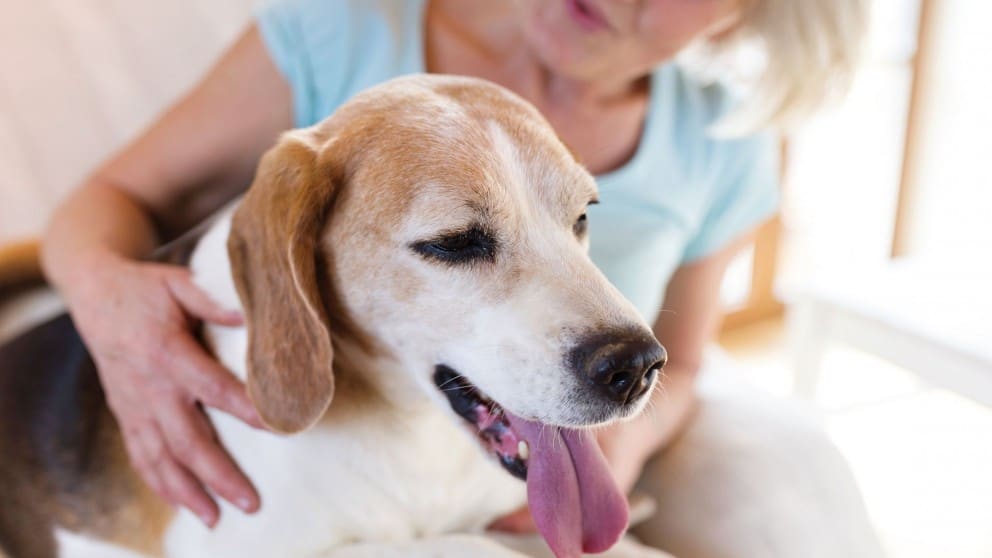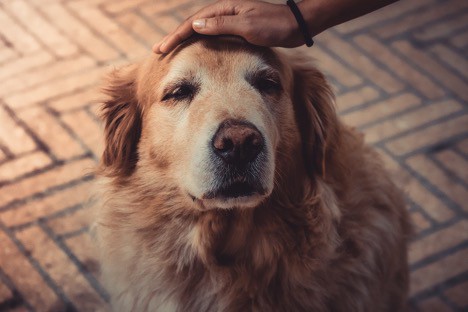What is the Best Pet Insurance for Older Dogs?

Providing the best pet insurance for senior dogs allows for continuous and affordable veterinary care during your dog’s Golden years. As your pup ages, you’ll notice that he begins to slow down and may have a hard time getting up and lying down. Older dogs are also more prone to diseases, especially within certain breeds.
All pets, regardless of age, need routine health care coverage to help pay for regular veterinary visits and individual treatment plans to keep them healthy, pain-free, and allow for a high-quality life. It is important that you also choose a veterinarian to work with that makes you feel comfortable.
When you take out a reputable pet insurance health plan like Odie Pet Insurance, you’ll be keeping your dog healthy with regular veterinary office visits. Preventative check-ups are beneficial as your pup ages in that early detection and supportive care play an important role in your pup living a long and healthy life. In this blog, we’re going to discuss the best pet insurance for older dogs.
Senior dogs may be prone to an array of health issues, from periodontal disease, cataracts, hip dysplasia, glaucoma, and cancer. Your senior pet will have changes in its immune system and have a harder time combatting common diseases. As your pet ages, they may also be more prone to gaining weight as their metabolism slows down. Gaining excessive weight can cause other health issues in older age, such as osteoarthritis – so managing diet and consulting with a veterinarian about healthy body condition is crucial for older dogs. Overweight dogs have even been shown to have shorter lifespans.
Pet health insurance for senior pets will help you cover treatments for heart and joint disease, diabetes, and all the common ailments that old age brings with it.
It’s Never Too Late: The Truth About Pet Insurance for Seniors
Many pet owners believe that failing to purchase insurance when their pet was young may make coverage prohibitively expensive or impossible as their senior years arrive. Unfortunately, this misconception has deterred some pet owners from considering insurance for older furry companions. But buying coverage for your senior pet is still much better than having none! The truth is, it’s never too late to buy coverage, and even purchasing it later would still be better than never buying coverage at all.
One reason behind this may be insurers’ belief that senior pets are more prone to preexisting conditions that they use as grounds to deny coverage for. While pre-existing conditions typically aren’t covered, that doesn’t mean senior pets cannot get coverage in case new conditions emerge later. Purchasing pet insurance gives you peace of mind knowing your furry friend will always be protected against unexpected illnesses or injuries, regardless of their age.
Pet insurance providers recognize the fact that pet owners may consider purchasing coverage for senior animals, and many provide policies specifically tailored for this age range. While some of these plans may include restrictions or higher premiums compared to their policies designed for younger animals, they still provide valuable coverage that helps offset the costs of veterinary care.
According to the American Kennel Club, annual costs associated with vet care for dogs average approximately $1,000.
Pet insurance can help offset costs associated with senior pet care, making it more affordable to provide them with what they require. However, only 44.6% of pet owners currently possess pet insurance policies, meaning the vast majority are unprotected against the rising costs of veterinary care.
How does it work?
Your senior dog may have an illness or injury, and you’ll need to work with your veterinarian to ensure he gets the right care. Whatever you decide to do, it’s important to understand that older dogs’ pet insurance ensures hospice care until the very end. In fact, most pet insurance will even cover the cost of end-of-life care and costs associated with the passing of your beloved pet.
That said, it’s best to get pet insurance early on since some pet insurance policies are very pricey for senior pets. Odie has one of the most price-competitive policies for older pets on the market, especially since the inspiration for starting the company came from Miles and Zabrina’s senior dogs.
However, you should be aware that some pet insurers set a cap around 14 years of age, and prices usually spike after 10 years. Odie is an example of a provider with no age or breed limits.
Senior pups face numerous physical challenges combined with age-related health conditions like kidney failure, dementia, cancer, and hearing loss. Most pet parents opt to enroll in a pet insurance plan to prepare for veterinary emergencies. When shopping for senior pet insurance, you’ll need to keep some considerations in mind. Here’s the take on what to look for when purchasing senior pet insurance.
How is it Different from Insurance for Younger Dogs?
Pet insurance, where you mix, match, and craft the perfect health plan for your furry best friend, is a good option for pet parents of senior pets who are looking to keep veterinary care costs manageable.
Older pets are more expensive than pups to care for, and even if you haven’t purchased pet insurance for your senior pet yet, it’s important to do so for the future. There cannot be enough said about the importance of purchasing pet insurance early on to cover all conditions with no pre-existing conditions left out.
With Odie Pet Insurance, enrollees have an array of options for accident, illness, and wellness plans for cats and dogs, as well as 3 additional supplemental plans that you can add to your policies. Best of all, Odie offers the shortest waiting time before claims are approved and your policy goes into effect.
Shortest Waiting Period
A waiting period is the amount of time you’ll need to wait before your insurance policy goes into effect. Basically, you’ll need to wait until the waiting period is up before you can make a claim.
Odie Pet Insurance offers some of the shortest waiting periods in the industry. Once met, waiting periods are waived for continuous, uninterrupted policy renewals. Here’s the take on Odie Affordable Pet & Health Insurance.
- 3 days for Accidents
- 14 days for Illnesses
- 6 months for Cruciate Ligament Events and any related conditions.
- Routine care plans can be used the day after you enroll.
Geriatric Health Challenges
When looking for senior pet health insurance options, you’ll need to be extra curious and really search because many plans will not include cancer treatment or coverage for chronic conditions that were diagnosed before purchasing your new policy. It’s a common misconception that health insurance for senior pets is not worth it because chronic conditions are not covered, but they’re only excluded from most policies if they are pre-existing.
Some pet insurance companies, such as Healthy Paws, will limit coverage after a certain age, so once again, it’s imperative to take out a pet insurance plan while your furry best friend is still going through puppyhood.
Your furry best friend will generally be considered a senior from around 10 to 12 years old. Larger dog breeds are considered senior pets when they reach six, and smaller breeds by the time they are seven. It’s important to understand that if you purchase pet health insurance during your pup’s geriatric years, the condition may be considered a pre-existing condition and will not get covered.
This should be done as soon as you bring your furry best friend home to ensure that your dog is covered later on. Mobility aids like dog carts, specialized harnesses, wheelchairs, and slings may add up to plenty, especially if they must be custom fitted for your pup. Degenerative disc disease is common in senior pets, and by taking out comprehensive pet insurance, you’ll be able to afford all the additional veterinary costs that occur later on.
Cancer
Not all cancers or illnesses can be cured. In the face of any health challenges, your senior dog may also be suffering from pain. Your pup may also need comfort care, most especially during cancer treatment. The ASPCA adds that senior pets may be more likely to get cancer with lymphoma (cancer of the white blood cells), more common in senior years in both cats and dogs. They add that dogs may also be more prone to getting soft tissue, skin, and bone cancer.
The treatment needed for cancer may cause considerable pain and discomfort with significant adverse effects. When this is the case, you’ll need to provide your pup with comfort care in his final days or months to prevent pain and discomfort.
During this stage of your pet’s life, you’ll be focusing on a stress-free environment in familiar surroundings to help your pup live out his final days in the best environment possible. The take with all pet insurance is to get your pet insured from a young age.
By doing so, you’ll save money since some pet insurance plans cost more for senior pets that have not been insured before. Keep in mind that if your pup is older than fourteen, you may have difficulty finding him complete coverage. If you’re having trouble finding complete coverage, Odie has no limits on age and will cover your 14+ year-old dog.
Nutritional Support
All animals need adequate nutrition to live a healthy life. If your senior dog has cancer, he may need different foods together with supplements while undergoing cancer treatment because cancer and cancer treatments will alter your pup’s metabolism.
Remember that pet insurance may also cover special pet food diets that your pet may need as he ages. If your vet prescribes a special dog food formula for issues like bladder stones, diabetes, or even cancer or liquid food, pet insurance will also cover that. Long-term health conditions occur frequently, and conditions like diabetes make having long-term pet insurance worth taking out.
Your furry best friend may also lose his appetite while undergoing cancer treatment, and if he doesn’t eat enough while undergoing treatment, tissues may be broken down to create the energy that he’ll need to survive. The same applies to dehydration.
If your senior pup is diagnosed with cancer or another illness, special nutritional supplements or a feeding tube may be needed to prevent dehydration.
Dental Treatments for Senior Pets
Like humans, pets may be prone to more medical issues as they age, and some will be prone to severe progressive dental issues that are painful. Dental cleaning and other surgical procedures can add up over the years since pet insurance does not cover them.
Gum disease is common in pets. By taking full dental coverage for your pet through a routine care add-on, you’re not only supporting costs for cleanings and regular dental care but also coverage for unexpected dental surgeries that need to be done.
Thyroid Disorders
Thyroid hormones regulate metabolic rates or the speed at which the body processes. If there is too little hormone, this causes the body to be sluggish. On the other hand, if there is too much hormone, the body tends to run faster.
Hyperthyroidism
Hypothyroidism occurs when the body produces too much of the thyroid hormone, leading to slower metabolic rates and altering various organ systems’ proper functions. If your senior pet displays signs such as lethargy, dry skin patches, increased shedding rates, weight gain, or decreased appetite, it’s wise to consult their veterinarian immediately to explore hypothyroidism as an option.
Hypothyroidism in dogs can be treated successfully using synthetic thyroid hormone medication such as levothyroxine to replace deficient levels and restore metabolic functioning in their bodies.
Your veterinarian will work closely with you and your pup to identify an individualized dosage and closely monitor their response through follow-up visits and scheduled check-ins. It’s crucial that all prescribed medication be strictly adhered to and scheduled check-ups to be attended in order to effectively manage hypothyroidism in your dog.
Kidney Disease
Kidney failure most often affects senior cats but can be treated with special fluids, special diets, and medications. The kidneys are most important in that they filter waste from the blood. If they don’t function well, waste products can build up to dangerously high blood levels.
Chronic kidney disease may take a few months or years before your pup shows symptoms. Existing damage can’t be reversed, but dogs with as little as 5% kidney function can survive with proper treatment.
If your pup has been diagnosed with kidney disease, you’ll need to visit your vet every few months or more frequently. Changes to the diet by supplementing fish oil and lowering phosphorous level intake may help prevent kidney disease from worsening. Special diets made specifically for dogs with kidney disease are usually prescribed.
Euthanasia
When faced with the heartbreaking decision of having to say goodbye to your senior pet who suffers from long-term health conditions, euthanasia should be carefully considered.
There are various compassionate options for euthanasia treatment available that are covered by pet insurance, allowing your beloved companion to pass peacefully at home and in familiar surroundings. This approach ensures they experience their final moments with the love they’ve known for their whole life.
Cataracts and Degenerative Vision Disorders
Vision issues are commonly observed in older dogs and can significantly impact their quality of life.
Cataracts, which involve clouding of the lens inside of an eye, can significantly impair your dog’s vision and may develop due to genetic predisposition, diabetes, trauma or other underlying health conditions. If you notice symptoms such as an unusual bluish-grayish hue in their eyes, increased clumsiness or difficulty with familiar environments, it’s crucial that you seek medical advice promptly from a veterinarian.
Cataract surgery is an option available to many dogs suffering from cataracts. Veterinarian ophthalmologists can evaluate your pet and decide if surgery would be beneficial.
As older dogs age, their vision may deteriorate due to progressive retinal atrophy (PRA) or glaucoma – two eye conditions caused by genetic mutations and degenerative eye conditions. PRA involves degeneration of retina cells which causes gradual vision loss, while glaucoma causes increased pressure within the eye which can damage optic nerves leading to eventual blindness. Regular vet check-ups are essential in the early identification and management of such conditions.
Are Senior Dogs More Accident-Prone?
As dogs age, their physical and cognitive changes may make them more accident-prone. Senior dogs may have trouble seeing or hearing, increasing their chance of bumping into objects, tripping and falling, or not responding to commands when in danger. Joint pain, muscle weakness, or arthritis can also make it more difficult for senior dogs to maintain balance when they’re walking.
Additionally, they could experience bladder control issues or digestive problems, increasing accident risks from slipping and falling. Your senior dog can lead a happy and healthy life with proper care and attention!
What to Keep in Mind When Caring for Senior Dogs

Senior dogs require different kinds of care to maintain their health and well-being as they age. Here are a few things to keep in mind when caring for your senior dog:
Adjust Their Diet as Necessary
Senior dogs have more specific nutritional needs that vary from those of younger dogs. Specifically, they need fewer calories to maintain a healthy weight and more fiber to support digestive health. Furthermore, diets rich in proteins may benefit muscle mass maintenance and joint health in senior dogs. Consult your veterinarian about which diet would work best for your senior pet. Older dogs might also need special foods that are easier to eat, particularly if they are weaker or showing signs of difficulty eating due to dental or digestive issues. Some older dogs benefit from being on wet food diets that are easier to swallow and chew. Other dogs might prefer kibble that has been mixed with broth or water to soften it and increase the amount of hydration. Dehydration can be a big issue for older dogs, particularly when concerned about kidney function, so making sure your senior dog is drinking enough water or getting enough moisture from their food is critical.
Consider Dietary Supplements
Certain supplements can support the health and well-being of senior dogs. Supplements containing glucosamine and chondroitin may assist in joint health and mobility, while omega-3 fatty acid-containing supplements may benefit heart health and cognitive functioning. It’s best to consult your veterinarian regarding which options might best suit your senior pup. CBD supplements have also been shown to help reduce joint pain and make older dogs more comfortable (link to CBD article?). Probiotic supplements can be helpful in maintaining a healthy digestive system and relieving gastrointestinal symptoms like gas or loose stools.
Ensure Their Environment Is Accessible
Senior dogs may need assistance when climbing stairs and getting in and out of vehicles, so installing ramps or providing steps can help them navigate. Furthermore, ensure their living environment is clear of hazards that could cause them to trip and fall.
Provide Mental Stimulation
Senior dogs may suffer cognitive decline with age, leading to boredom and depression. You can stimulate your senior dog’s mind by providing mental stimulation through puzzle toys, training exercises, or regular playtime sessions. Studies have suggested that behavioral enrichment in dogs may help slow down or prevent cognitive decline and help your dog’s mind stay sharper for longer.
Stay Current with Preventative Healthcare
Senior dogs require regular checkups and preventive care visits with their veterinarian to maintain good health. Regular veterinary visits allow veterinarians to detect potential health issues quickly before they become more serious.
Keep Their Nails Trimmed
Long nails can become uncomfortable for your senior pet or interfere with walking. To avoid injuries, be sure to keep them short and out of the way by regularly trimming them.
Monitor Their Water Intake
Senior dogs may struggle to regulate their water intake, leading to dehydration or other health concerns. Ensure they always have access to clean water without any nearby tripping hazards. You should also pay attention to other animals in your home and ensure they don’t have access to your senior dog’s water supply.

Average Vet Costs for Senior Dog Procedures
Exact costs will vary between locations and healthcare providers, but here are some average vet costs for the visits most often required for senior dogs:
| Procedure | Average Cost |
| Routine checkup | $100-$150 |
| Dental cleaning | $70-$400 |
| Blood test | $80-$200 |
| Urine test | $25-$50 |
Do Senior Dogs Go to the Vet More Often?
Senior dogs may require more frequent veterinary visits than younger animals due to increased health issues that require monitoring and preventative measures. Generally, they should see the vet every 6 months instead of every year once they become a senior, which happens after seven years of age. Your veterinarian can help determine the appropriate schedule based on their health status.
Dog Insurance Plans for Senior Dogs
According to a New York Times article, more than 2 million pets in the US and Canada were insured by the end of 2017, up by 17% from 2016. As your furry best friend ages, so does your ability to purchase pet insurance for the golden years. It may also increase your premium for a pet policy. Older pets have an increased chance of injury, illness, or disease and will need more frequent veterinary care.
Annual price increases are common once you get coverage due to the potential need for increased veterinary care. That said, you’ll need to maintain health care for your pup so that you can manage veterinary health care for your pet. When choosing a pet health insurance for your senior pet, you’ll need to compare plans and policies and read reviews and insurer information.
What is the Best Pet Insurance for Older Dogs?
Expenses linked to pet health insurance usually will include premiums and some out-of-pocket expenses like deductibles. Deductibles are similar to health insurance deductibles and need to be paid upfront before the pet insurance goes into effect.
You can purchase pet insurance through your employer to lower premiums and get more your pet insurance. This will cover less than 100% of veterinary costs after the deductible. Keep in mind that you’ll still need to pay a small portion of your vet bill. The Society of Resource Management (SHRM), according to a 2018 survey, added that up to 11% of employees offered pet health insurance benefits.
Supplemental Benefits
With some pet insurance companies like Odie Pet Insurance, you can add up to three kinds of supplemental benefits. This helps to ensure that your pup always has the right coverage and covers the following:
- Office visits & exam fees
- Take home prescription medications.
- Rehabilitation, acupuncture, and chiropractic care
While regular office visits are not covered for annual exams or vaccinations, they allow for vet exams and office visits for suspected injuries or illnesses. If your furry best friend gets ill or injured, you’re covered even if they don’t need treatment.
Treatment options include an array of options like electro-acupuncture, E-stim therapy, treadmill, laser therapy, gait training, stretching, and more. Adding this supplemental insurance not only covers the cost of rehab services but may be the difference in your pet’s quality of life.
Take-Home Prescription Medications
Take-home prescriptions allow for optimal recovery and can be used to cover drugs, medications, or treatments given by your veterinarian for an eligible condition. The coverage includes the following:
- Supplements
- Remedies & treatments
- Over-the-counter pet meds
- Prescriptions
- Rehabilitation, Acupuncture & Chiropractic Care
This entails coverage for physical therapy and rehabilitative services, which are important throughout your pup’s life and helps with mobility and functional movements. Not only is this important for ensuring pain-free mobility, but an adjustment will also restore motion to a joint, decrease inflammation, and aid in decreasing pain.
Senior dogs do well with animal chiropractors that help in addressing age-related conditions in senior pets. Many senior pets are diagnosed each year with spinal or disc conditions, organ issues, and other age-related problems.
Pet health insurance allows for non-invasive treatment and is favored by pet parents today as an adjunct treatment option. Before opting for a pet insurance plan, ask whether they cover alternative care like chiropractic care, hydrotherapy, and acupuncture. Remember that all alternative care must be provided by a licensed veterinarian.

Odie, the Best Pet Insurance for Older Dogs
If you’re shopping for pet insurance for your older dog, you may be surprised to learn that many pet insurance companies won’t insure an older dog, particularly if they have pre-existing conditions or other health issues. But many won’t even offer insurance if your pet has entered their teenage years, never mind one pushing 15+ or even up into their twenties.
However, if you’re debating between various pet insurance companies or considering going without coverage at all, it’s important to know the risks upfront. Pet insurance for older dogs can be a lifesaver, literally — and by getting the best pet insurance for your older dog, you’ll be protecting yourself from outsized vet bills you may struggle to pay. Worse yet, you may have to opt for putting your beloved pet down if things really get out of control.
Why Odie Pet Insurance Makes Sense
Unlike other insurers that will cut you off once your pet reaches a certain age — or they might not even insure you upfront — Odie pet insurance is great for older dogs with health issues and other challenges. We know how hard it is to care for an aging pet, and we want to make it as easy as possible to get the coverage you need for your elderly pet. You wouldn’t think about going without health insurance in your golden years, so why risk it with anything less than the best pet insurance that you can get for your older dog?
It all starts with comprehensive coverage, which covers things like accidents, injuries, and illnesses. You could get pet insurance that only covers accidents, but you’ll likely regret it if your pet develops some kind of illness — and if they already have a pre-existing illness, you won’t really be able to get by with that kind of coverage. For most consumers, comprehensive pet insurance is the best bet.
That said, the coverage of routine vet visits and exam fees will depend on your chosen policy. Some do not include these items, while others bundle them in or offer them as an option.
With the best pet insurance for older dogs, you’ll be able to treat your pet like a true family member, complete with the kind of comprehensive coverage you’d get for yourself or anyone else in the family. That’s a good idea because animal health care is getting more expensive and sophisticated, meaning that just one visit to the vet could leave you with a significant bill that you may struggle to pay.
It Doesn’t Matter How Old Your Dog Is
While every little detail matters, your dog’s age is the most important piece of senior dog insurance. Here at Odie Pet Insurance, we’re proud to offer the best insurance for older dogs by covering dogs of all ages. Seriously. Even if your dog is well into their teens or pushing 20, we’ve got you covered.
Most other insurers cut off their coverage just as you’re more likely to need it, but any pup over past a few years old is considered an adult as growth slows as they mature into middle and old age. However, not all dogs will age at the same rate. In fact, larger dogs age much more quickly than smaller dogs due to various reasons. That’s why the average mastiff lives to seven while a miniature poodle could live to double that age.
Combined with age, that means the breed is also an important consideration and may affect your rate, but it won’t affect whether or not you can get coverage for your aging pup with Odie.
Do Accident and Wellness Policies Cover Senior Dogs?
Yes, accident and wellness policies for senior dogs are available. The Accident Only Plan is an example of an insurance plan that provides coverage for unexpected injuries, wounds, and treatments for senior dogs. It starts as low as 25 cents a day, making it an affordable solution for pet owners. However, this plan does not cover preexisting conditions or preventative care plans.
This is where Odie’s Wellness Plan comes in. It’s an add-on for any Odie insurance policy, which covers preventative care such as dental cleanings, vaccines, and blood exams, helping pet parents keep an eye on the well-being of their senior dogs. This comprehensive solution will ensure your pup gets all of the attention and care they need in their old age.
Will My Senior Dog’s Pre-Existing Condition Be Covered By Insurance?
Most pet insurance policies will not cover pre-existing conditions affecting an elderly dog, such as injuries, illness, or health issues incurred prior to their effective date. A pre-existing condition refers to injuries, illnesses, or health concerns that existed prior to signing your policy agreement.
It’s important to read through your policy’s fine print carefully to fully understand which conditions are covered by insurance and which ones aren’t. Some policies offer limited pre-existing condition coverage after an initial waiting period has passed, while others may cover them entirely. Consider purchasing a wellness plan as an add-on if you’re concerned about your senior pup’s pre-existing conditions.
Do Pet Insurance Plans Cover End-of-Life Care for Elderly Dogs?
End-of-life care coverage varies based on both your insurance policy and provider. Some policies may restrict which forms of end-of-life care they cover, while others offer more comprehensive policies. It’s essential that you read over each policy thoroughly and discuss any terms or conditions with them beforehand before purchasing your coverage plan.
If You Don’t Know, Talk to an Expert

Senior pet insurance is a wonderful way to show that you care. It’s also important that you show family members that pet insurance is an affordable way to take care of the ever-increasing veterinary costs as your pet ages so that your children will, later on, follow your example.
Pet health insurance for all pets, regardless of whether they’re senior pets or young pups, offers you peace of mind and allows you to afford regular veterinary care regardless of any additional costs. It sure beats taking out a short-term loan with a high-interest rate to cover an emergency veterinary bill.
Opt for well-respected pet insurance plans like Odie Pet Insurance plans that are straightforward to read and offer customized options for optimal pet health coverage. With the rising popularity of alternative therapies and natural healthcare for pets via supplements like CBD, opting for the best pet health insurance for 2023 is important.
Planning to get insurance for your fur babies? This article provides a guide to understanding pet insurance.
References
https://www.nytimes.com/2019/01/04/your-money/pet-insurance-policies.html
https://www.aspcapetinsurance.com/resources/how-to-care-for-senior-pets/
https://www.avma.org/blog/revised-policy-encourages-proactive-education-about-pet-insurance



